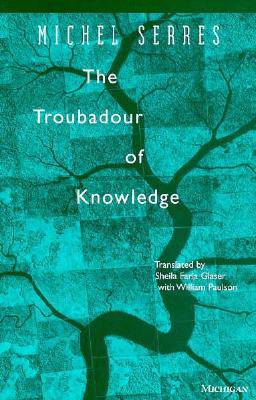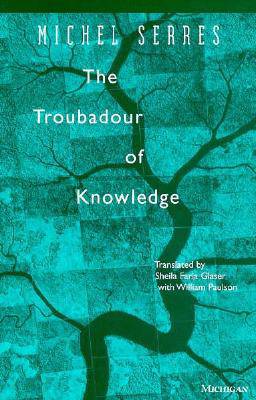
Bedankt voor het vertrouwen het afgelopen jaar! Om jou te bedanken bieden we GRATIS verzending (in België) aan op alles gedurende de hele maand januari.
- Afhalen na 1 uur in een winkel met voorraad
- In januari gratis thuislevering in België
- Ruim aanbod met 7 miljoen producten
Bedankt voor het vertrouwen het afgelopen jaar! Om jou te bedanken bieden we GRATIS verzending (in België) aan op alles gedurende de hele maand januari.
- Afhalen na 1 uur in een winkel met voorraad
- In januari gratis thuislevering in België
- Ruim aanbod met 7 miljoen producten
Zoeken
€ 45,45
+ 90 punten
Omschrijving
What do we do when we raise a child, teach a student, or educate a person as a member of society? For the French philosopher Michel Serres, all of these forms of pedagogy require painful yet exhilarating departures from home and encounters with Otherness. Like a swimmer who plunges into the river's current to reach the opposite bank, the person who wishes to learn must risk a voyage from the familiar to the strange. True education, Serres writes, takes place in the fluid middle of this crossing. To be educated is to become a harlequin, a crossbreed, a hybrid of our origins--like a newborn child, complexly produced as a mixture of maternal and paternal genes, yet an independent existence, separated from the familiar and determined.
In this wide-ranging meditation on learning and difference, Serres--the scientist turned epistemologist, philosopher turned moralist, reveler of being a half-breed from every point of view--explores numerous pathways in philosophy, science, and literature to argue that the best contemporary education requires knowledge of both science's general truths and literature's singular stories. He heralds a new pedagogy which claims that from the crossbreeding of the humanities and the sciences a new educational ideal can be born: the troubadour of knowledge.
With his agile and poetic voice, Serres has created a meditation of precisely this pluralistic creation, deftly recognizing it as a third party bred not of orderly dialectics but of the destabilizing multiplicity of the present age. Those who know the enormous range and clarity of this thinker will welcome this latest volume translated into English by Sheila Glaser with the assistance of William Paulson.
Michel Serres has taught at Clermont-Ferrand, the University of Paris VIII [Vincennes], the Sorbonne, and Stanford University, and has served as visiting professor at Johns Hopkins University. Other works of his available in English translation include Conversations on Science, Culture, and Time (with Bruno Latour), Genesis, and The Natural Contract, also published by The University of Michigan Press.
Sheila Glaser is Reviews Editor of Artforum magazine. William Paulson is Professor of French and Chair of the Department of Romance Languages and Literatures at the University of Michigan.
In this wide-ranging meditation on learning and difference, Serres--the scientist turned epistemologist, philosopher turned moralist, reveler of being a half-breed from every point of view--explores numerous pathways in philosophy, science, and literature to argue that the best contemporary education requires knowledge of both science's general truths and literature's singular stories. He heralds a new pedagogy which claims that from the crossbreeding of the humanities and the sciences a new educational ideal can be born: the troubadour of knowledge.
With his agile and poetic voice, Serres has created a meditation of precisely this pluralistic creation, deftly recognizing it as a third party bred not of orderly dialectics but of the destabilizing multiplicity of the present age. Those who know the enormous range and clarity of this thinker will welcome this latest volume translated into English by Sheila Glaser with the assistance of William Paulson.
Michel Serres has taught at Clermont-Ferrand, the University of Paris VIII [Vincennes], the Sorbonne, and Stanford University, and has served as visiting professor at Johns Hopkins University. Other works of his available in English translation include Conversations on Science, Culture, and Time (with Bruno Latour), Genesis, and The Natural Contract, also published by The University of Michigan Press.
Sheila Glaser is Reviews Editor of Artforum magazine. William Paulson is Professor of French and Chair of the Department of Romance Languages and Literatures at the University of Michigan.
Specificaties
Betrokkenen
- Auteur(s):
- Vertaler(s):
- Uitgeverij:
Inhoud
- Aantal bladzijden:
- 184
- Taal:
- Engels
- Reeks:
Eigenschappen
- Productcode (EAN):
- 9780472065516
- Verschijningsdatum:
- 17/10/1997
- Uitvoering:
- Paperback
- Formaat:
- Trade paperback (VS)
- Afmetingen:
- 141 mm x 216 mm
- Gewicht:
- 272 g

Alleen bij Standaard Boekhandel
+ 90 punten op je klantenkaart van Standaard Boekhandel
Beoordelingen
We publiceren alleen reviews die voldoen aan de voorwaarden voor reviews. Bekijk onze voorwaarden voor reviews.









